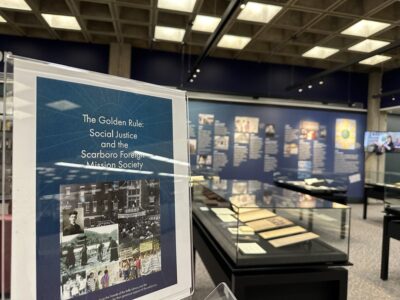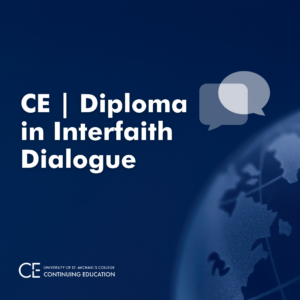Simon Burke is a recent graduate of St. Michael’s Diploma in Interfaith Dialogue. Originally from Dundee, Scotland he grew up in Wallaceburg, Ontario. He is a longtime public servant, having held senior offices within the Canadian and Ontario governments and in university administration. Over the course of his career he led consultations that resulted in comprehensive legislation for persons with disabilities, prohibition of discrimination based on sexual orientation, civil liberties protections during emergencies, restorative justice systems to better meet the needs of victims of violent crime and the priorities of First Nations communities. He has served as Director Ethics in the Ontario Public Service, Director of Ontario’s Pay Equity Commission, Director of Policy to Canada’s Minister of Global Affairs and was the Senior Executive Officer and Chief Administrative Officer of the Criminal Injuries Compensation Board. He was responsible for the operational and governance reviews of the Ontario Parole Board, the Ontario Civilian Police Commission and the Ontario Trillium Foundation. He is a Board Director with the Catholic Congregational Legacy Charity and Catholic Health Sponsors of Ontario which provides sponsorship to 22 health care organizations originally established by seven congregations of religious Sisters. The Sisters were health care pioneers who created a culture of compassion to prioritize serving the vulnerable and those most in need.
When there was a lot more snow on the ground, recent graduates of the Diploma in Interfaith Dialogue were asked to get together with Roxanne Wright, Manager of Program Development and Delivery, Continuing Education, to discuss our learning experience with the diploma. Kudos to St. Mike’s for wanting to further develop this new, important and much needed offering — and making it more widely accessible.
Pursuit of self-knowledge is the critical feature of a university’s aims and objectives and this program at St. Mike’s has embraced the study of our community’s cultural and faith communities and their interactions. Those able to attend the evening conversation with Roxanne were happy to help because the value of the program and its founding sponsor, Scarboro Missions, is so self-evident — knowledge about our faiths can be and should be put at the service of our society to respond thoughtfully and effectively to practical problems. Indeed, Pope Francis in his recently published “Fifteen Rules for a Good Life” offers that Rule #4 is to believe in the existence of lofty and beautiful truths. He may well have been referencing interfaith dialogue when noting that “…the world moves forward thanks to men and women who broke down walls, built bridges, dreamed and believed….”.
It is quite fitting that the University of St. Michael’s College, an important Canadian and Roman Catholic institution at the centre of one of the most multicultural and multi-faith city in one of the most ethnically diverse countries in the world, offers a continuing education program that engages learners with a deeper understanding of Catholicism and with leaders from many of Toronto’s faith communities (Buddhist, Christian, Hindu, Indigenous, Muslim, Judaism, Sikh). The program is straightforward. Students learn about the foundations of each faith tradition and its practices. The origins, the central teachings, the denominational practices, and social and political influences of each faith community are considered with care and respect. Courses benefits from engagement with experts, scholars and trained practitioners of interfaith encounters. For example, the course on Sikhism included a wonderful class trip to a Gurdwara where we were generously welcomed and very well fed. All this learning is delivered usefully within the framework of a comparative perspective.

In discussion with Roxanne there was a clear consensus that the program is a timely survey of the tenets of religions and religious practices with valuable emphases on similarities and differences. More strongly expressed was that the program is an important platform for Catholics as well as persons from other faiths (or none at all) to develop a deeper appreciation of the shared values of many faiths – ‘The Golden Rule’.
Moreover, courses offer a critical perspective on the value-add that dialogue between people of differing faiths can play in better understanding themselves in relation to peoples of different faith backgrounds. In short, the program awakens participants to the histories of faiths and equips people with an essential cultural competence. Developing practical competencies to structure meaningful connections between peoples of different faiths can bridge differences and encourage understandings. Surely our neighbourhoods and indeed our world need more understanding — not less — of others. The program points to a path less travelled where we can engage with peoples outside our own communities. Essentially, the program serves up a framework for listening and for learning so we can respectfully meet, greet and, one hopes, protect each other.
Over a two-year period I was able to participate in classes exploring issues associated with the fraught histories of religion and world migration, inculturation, mysticism, and women and religion. I feel fortunate to have taken classes in Islam, Judaism, Buddhism and Sikhism, especially during a time fraught with such tension and such sorrow. More often than not lectures led to well-considered class discussions facilitated by the practical contributions of guest lecturers, including religious leaders, elected officials, community advocates, teachers and senior leaders in the not-for-profit sector.

I feel quite lucky to have spent several Monday evenings in the company of others discussing the problems and prospects of interfaith dialogue to strengthen solidarity with human rights, human dignity and the common good. For me, the lectures and experiential learning opportunities that had Nostra Aetate at their core (the 1965 proclamation made by His Holiness Pope Paul VI entitled the ‘Declaration on the relation of the Church to non-Christian Religions’) were highlights. Doctoral candidate Mia Theocharis in ‘Catholic Perspectives on Ecumenical and Interreligious Dialogue’ got us to think deeply and critically about our personal roles in bringing to life the idea that the Catholic Church “…rejects nothing that is true and holy in [non-Christian] religions.” Dr. John Sampson’s curated lectures on inculturation were comprehensive assessments of the Church’s declaration of reverence for “…those ways of conduct and of life, those precepts and teachings which, though differing in many aspects from the ones she holds and sets forth, nonetheless often reflect a ray of that Truth which enlightens all men.”
The program was a good fit for my learning needs. In my role as a board member for a Catholic healthcare and social services organization with a mandate to further the “healing ministry of Jesus” knowing about the principles and practices and necessity of interfaith dialogue in Canada is a critical requirement. Truly responding to the needs of people and communities who have experienced or are experiencing marginalization, oppression and discrimination requires listening skills both at the personal and institutional levels. St. Mike’s has offered me an appreciation for the value of interfaith dialogue and its associated mechanisms to bring people together, build relationships and foster partnerships for the common good.
The Diploma in Interfaith Dialogue is open to all and accepts applications throughout the year.
Read other InsightOut posts.
